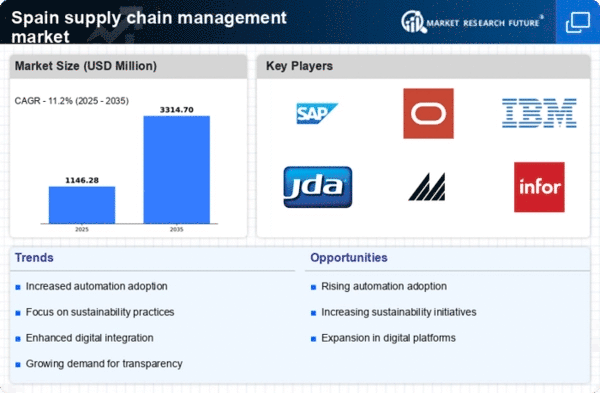Focus on Cost Efficiency
Cost efficiency remains a critical driver in the supply chain management market in Spain. Companies are increasingly seeking ways to minimize operational costs while maintaining service quality. Strategies such as lean inventory management and strategic sourcing are being implemented to achieve these goals. Reports indicate that organizations that adopt cost-efficient practices can reduce their supply chain expenses by approximately 15%. This focus on cost reduction not only enhances profitability but also allows businesses to invest in other areas, such as technology and workforce development, further stimulating growth in the supply chain-management market.
Investment in Sustainable Practices
The supply chain management market in Spain is witnessing a shift towards sustainable practices as companies recognize the importance of environmental responsibility. Investments in green logistics, such as electric vehicles and energy-efficient warehousing, are becoming more prevalent. Research suggests that companies that implement sustainable supply chain practices can reduce their carbon footprint by up to 30%. This commitment to sustainability not only meets regulatory requirements but also appeals to environmentally conscious consumers, thereby driving demand in the supply chain-management market.
Technological Advancements in Logistics
The supply chain management market in Spain is experiencing a notable shift due to rapid technological advancements in logistics. Innovations such as artificial intelligence (AI), machine learning, and the Internet of Things (IoT) are enhancing operational efficiency and decision-making processes. For instance, AI-driven analytics can optimize inventory management, reducing costs by up to 20%. Furthermore, the integration of IoT devices allows for real-time tracking of goods, which is becoming increasingly essential in a competitive landscape. As companies adopt these technologies, they are likely to improve their responsiveness to market demands, thereby driving growth in the supply chain-management market.
E-commerce Growth and Consumer Expectations
The surge in e-commerce activities in Spain is significantly influencing the supply chain-management market. With online retail sales projected to reach €30 billion by 2025, businesses are compelled to enhance their supply chain capabilities to meet rising consumer expectations for faster delivery and better service. This shift necessitates the adoption of advanced logistics solutions and efficient inventory management systems. Companies that can streamline their supply chains to accommodate the demands of e-commerce are likely to gain a competitive edge, thus propelling the growth of the supply chain-management market.
Rising Demand for Transparency and Traceability
In the context of the supply chain-management market, there is a growing demand for transparency and traceability among consumers and businesses alike. Stakeholders are increasingly concerned about the origins of products and the ethical practices involved in their production. This trend is prompting companies to adopt more transparent supply chain practices, including the use of blockchain technology to ensure traceability. As a result, businesses that prioritize transparency are likely to enhance their brand reputation and customer loyalty, which could lead to increased market share in the supply chain-management market.
















